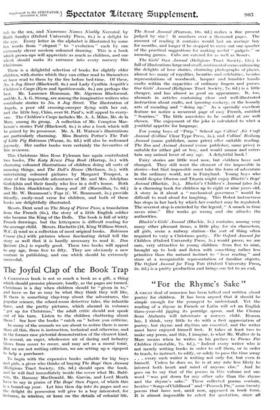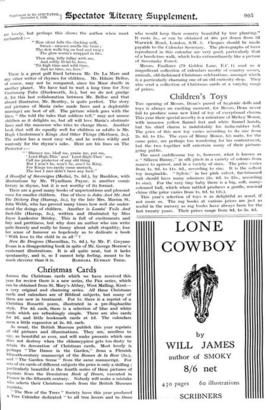"For the Rhyme's Sake"
A GREAT deal of nonsense has been talked and written about poetry for children. It has been argued that it should be simple enough for the youngest to understand. Yet the reading of a rhyme in French or Latin will set an English three-year-old jigging its porridge spoon, and the Chorus from Atalanta will intoxicate a nursery child. Reason has, I think, very little to do with a first appreciation of poetry, but rhyme and rhythm are essential, and the writer must have enjoyed himself first. It takes at least two to make any poem, and this, I imagine, is what Mr. Walter de la Mare means when he writes in his preface to Poems For Children (Constable, 7s. 6d.), " Indeed every writer who is not merely writing books in order to sell them, or in order to teach, to instruct, to edify, or solely to pass the time away . . every such writer is writing not only for, but even to himself. Unless he does so, he is at any rate less likely to interest both heart and mind of anyone else." And he goes on to say that of the poems in this volume not one word " was put down for any other sake than the rhyme and the rhyme's sake." These collected poems contain, besides " Songs of Childhood" and " Peacock Pic," some twenty poems that have not, until now, appeared in book form. It is almost impossible to select for quotation, since all
are lovely, but perhaps this shows the author when most
enchanted :—
" Now silent falls the clacking mill, Sweet—sweetersmells the briar ;
The deW walla big on bud and twig ; The glow-worm's wrapped in Gre.
Then sing, Tully lullay with me, And softly lit-lel-1o, love,
'Tie high time and wild time,
And no time, no, love."
There is a great gulf fixed between Mr. De La Mare and BR- other ther writer of rhymes for children. Mr. Hilaire Belloc, of course, may not be compared, since his Muse dwells in another planet. We have had to wait a long time for IV etv Cautionary Tales (Duckworth, 5s.), but we do not grudge it, for this last collaboration between Mr. Bellew and that absurd illustrator, Mr. Bentley, is quite perfect. The story and pictures of Maria (who made faces and a deplorable marriage) are best of all. The picture which goes with the lines, " She told the tales that soldiers tell," may not amuse children as it delights us, but all will love Maria's obstinate faces and the masseuse who tries to change them. Another book that will do equally well for children or adults is Mr. Hugh Chesterman's Kings And Other Things (Methuen, 5s.). The author has a most easy wit, and he writes wildly and wantonly for the rhyme's sake. Here are his lines on The Protector :— " ' Blarney me, bluff me, praise me, pat me,
' Lord-High-This' and Lord-High-That' me.
Call me protector of any old thing But I won't be, won't be, won't be King. For Kings too easily come unstuck, The last I met didn't have any luck."
A Handful of Sovereigns (Medici, 7s. 6d.), by Basildon, with illustrations by Mr. Wyndham Payne, is another comic history in rhyme, but it is not worthy of its format.
There are a good many books of unpretentious and pleasant verse for smaller children. One of these is John And Me And The Dickery Dog (Harrap, 5s.), by the late Mrs. Marion St. John Webb, who has proved many times how well she under- stood the doings of children. Another is Lambs' Tails And Such-like (Harrap, 5s.), written and illustrated by Miss Joyce Lankester Brisley. This is full of excitements and fury and prettiness, but why does an author who can write quite fiercely and really be funny about adult stupidity, lose her sense of humour so hopelessly as to dedicate a book " With love to the child in us all " ?
Here Be Dragons (Macmillan, 7s. 6d.), by Mr. F. Gwynn Evans is a disappointing book in spite of Mr. George Morrow's exuberant illustrations. It is all quite neat, but it lacks spontaneity, and is, so I cannot help feeling, meant to be



























































 Previous page
Previous page